Table of Contents
Once a best-kept secret of the East, matcha has taken coffee culture by storm, with sales in the U.S. increasing fivefold to over $10 billion over the past 25 years (1). The matcha industry is growing almost twice as fast as coffee (2).
This special tea is known for its striking green color, which is equally apparent whether it is enjoyed as a simple brew in water or a milky latte.
Tea is often considered to have a relaxing effect, but does matcha make you sleepy? Matcha comprises multiple natural chemicals with opposing impacts on alertness. Therefore, in this article, we will carefully unpack these effects and find a conclusion.
What is matcha?
Matcha is a type of tea with a green color and has powerful health benefits, but do not let the intense green color fool you — it is made from the same species that black and green tea are made of, called Camellia sinensis.
Matcha’s distinct properties are developed by growing C. sinensis plants of the Tencha variety in the shade, encouraging the production of active compounds that yield its unique characteristics (3). These include chlorophyll, which provides its vibrant green color, and theanine, responsible for the distinct herb-like but slightly umami taste (4). Other important compounds include caffeine, catechins, and phenols (3, 5).
Once ready, the tea leaves are dried and pounded to a very fine powder. The highest quality matcha is termed ‘ceremonial grade.’
Matcha is at the heart of the traditional Japanese tea ceremony, where participants prepare a rich infusion of matcha powder in hot water and savor it from bowl-shaped tea cups.
Effects on sleep and alertness
Recent studies have shed light on matcha’s dual capacity to enhance alertness, much like coffee, while also promoting a state of calm, making it both a remedy to improve your sleep and improve your focus ability to help you carry out attention-demanding tasks (6, 7, 8, 9, 10, 11, 12).
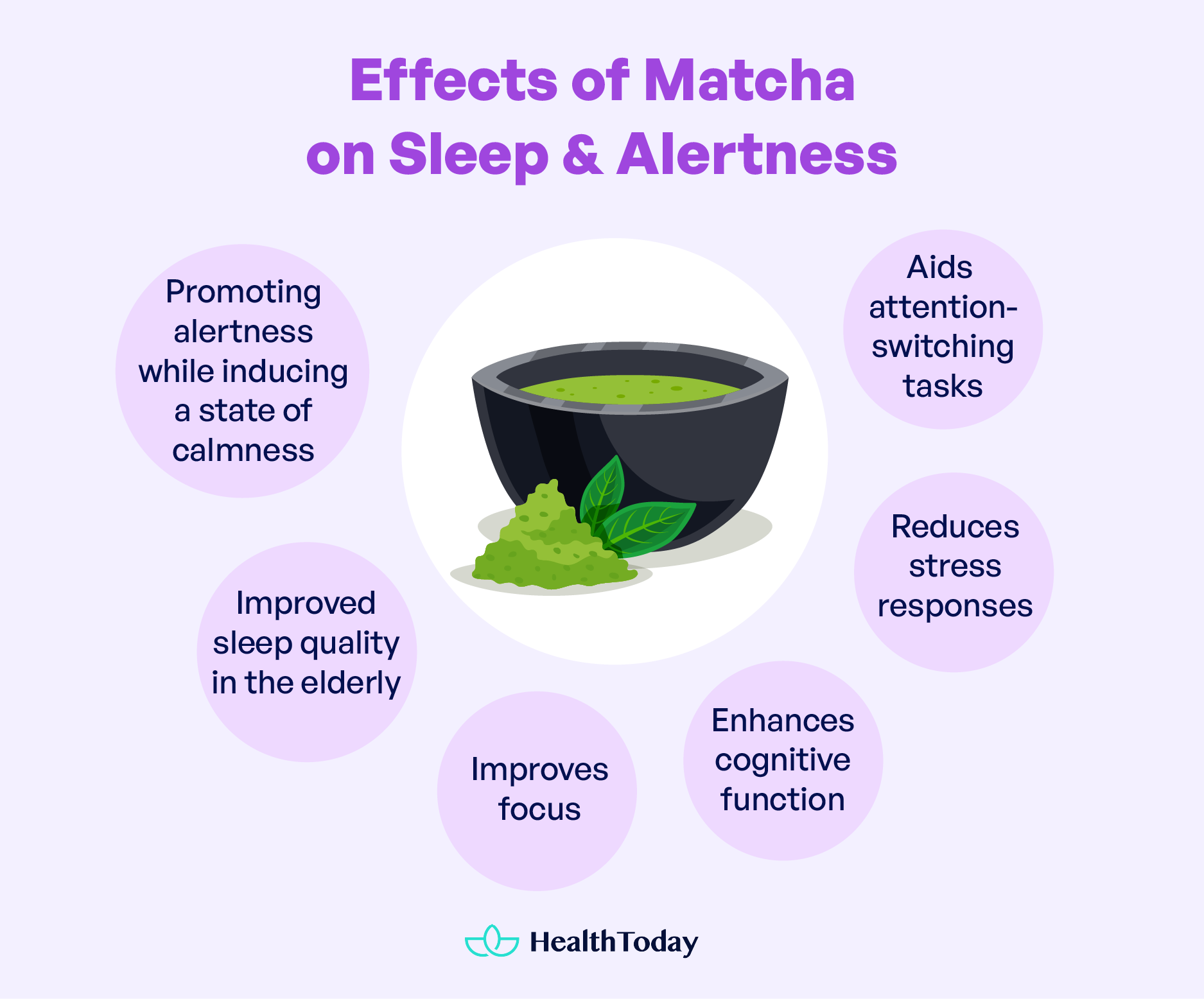
Does matcha make you sleepy?
Matcha has opposing properties: it promotes cognitive function and ability while simultaneously acting as a relaxant. This is due to the combined presence of L-theanine, an amino acid that increases brain dopamine while reducing stress responses with caffeine (6, 7, 8).
L-theanine can trigger an alpha brain wave state, a relaxed but awake state of mind (13, 14). Some researchers have argued that alpha band brain activity enables selective attention in the case of distractions, making it helpful for improving focus (15).
Caffeine found in matcha is a stimulant that increases alertness and the ability to perform cognitively demanding tasks (9).
Studies suggest that the combination of caffeine with L-theanine, which co-exist in matcha, can improve performance on ‘attention-switching tasks’ and reduce susceptibility to distractions and psychological stress (10, 11, 12). This effect can be described as a calm alertness that improves resilience in challenging situations.
Sleep quality and quantity
Chronic illness, including cognitive impairment in the elderly, often coincides with sleep disturbances (16). In one study, they gave a group of 99 elderly participants with cognitive impairment matcha to drink over 12 months. After the study, sleep quality and cognitive skills are improved (8).
However, sleep quality is improved significantly with caffeine-reduced green tea. Another research in 2017 explained that this is related to the suppression of stress by L-theanine, measured by salivary alpha-amylase (17).
Epigallocatechin gallate (EGCG) has also been shown to have a positive effect on sleep with an amount of caffeine up to 4.85 mg (18).
The effects on sleep, therefore, depend on the relative amounts of caffeine compared to relaxing compounds such as L-theanine and EGCG (19).
Tips for drinking matcha at night
Matcha provides a stimulant effect due to caffeine. Thus, there is concern about its impact on sleep if you have matcha at night.
It is best to abstain from drinking caffeinated drinks six hours before bedtime to avoid adverse effects on sleep (20).
Epigallocatechin gallate (EGCG), a catechin-type compound found in matcha, is another important compound for sleep. Studies suggest that consuming EGCG at least 30 minutes before bedtime could help improve sleep quality and reduce insomnia (18). However, it is important to note that the study used a combined treatment extract of EGCG with rosmarinic acid, another suggested calming ingredient, in an extract that contained up to 4.85 mg of caffeine.
Unfortunately, it can be difficult to control the amount of caffeine present when preparing a matcha drink, although it can be managed by reducing the brewing time (5).
Therefore, the best option would be to drink decaffeinated or low-caffeine matcha as early as possible in the evening to prevent any adverse effects of caffeine on sleep while benefiting from matcha’s calming effect.
H3: Matcha versus Coffee
Matcha has more caffeine than other green teas but less caffeine than coffee (5). Concentrations of caffeine vary for matcha and coffee. While caffeine in matcha is around 18.9-44 mg/g, different coffee beans have different amounts of caffeine (21):
- Arabica coffee beans: 0.90–1.3%
- Robusta: 1.51 to 3.33%
While coffee can promote better alertness and productivity, it can also induce stress responses, such as raised blood pressure (22).
Due to the presence of L-theanine, matcha’s simultaneously relaxing effect can provide a calm state of mind that helps you get the job done without the discomfort of stress responses (22).
Nutrition and other health benefits of matcha
Matcha is known for its rich cultural roots and a healthy drink (23).
Matcha packs with some powerful components that have been suggested to protect the heart from environmental hazards, safeguard against cancer and viruses, and restore cognitive function (23, 24, 25, 26, 27, 28, 29, 30, 31, 32, 33, 34, 35, 8).
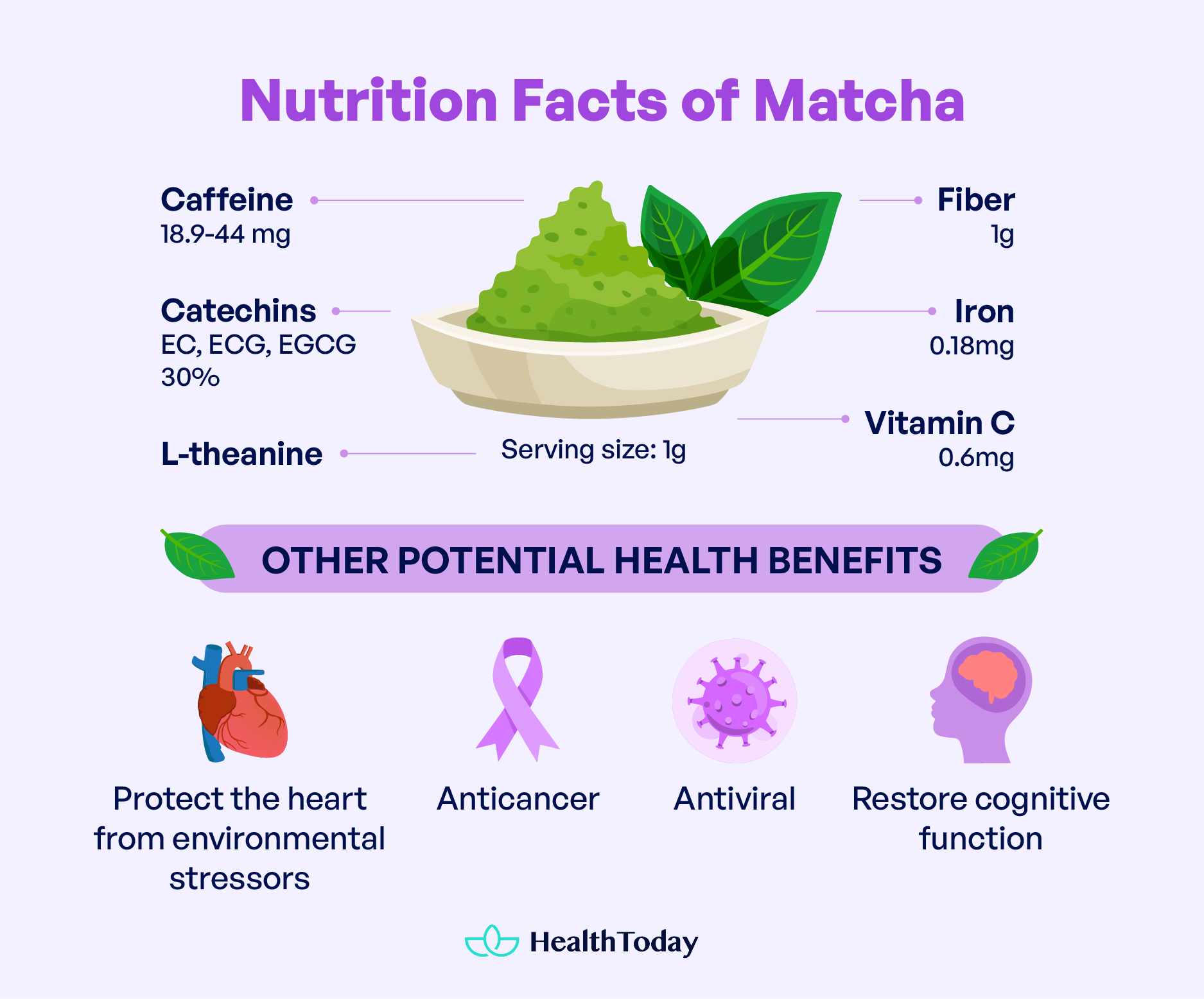
Nutrition facts
Up to 30% of the dry weight of matcha powder is made up of polyphenols (36), delivering neuroprotective properties, with catechins being the most distinguishing group to be found in matcha (37, 38, 39). These are phenolic compounds that act as antioxidants, which include:
- Epicatechin (EC)
- Epicatechin-3-gallate (ECG)
- Epigallocatechin (EGC)
- Epigallocatechin-3-gallate (EGCG)
EGCG is the most abundant in matcha and has the most biologically active effects of the catechins, contributing to many of its health effects (40, 41).
Catechins promote antioxidant action by neutralizing free radicals and enhancing the body’s detoxification capacity by supporting our naturally occurring enzymes in performing antioxidant actions. These compounds are reported to be even more powerful than Vitamin C and flavonoids (42).
Matcha is a complementary nutrient source. One gram serving contains (22):
- 1 g fiber (3% of the daily value)
- 0.6 mg Vitamin C (1% of the daily value)
- 0.18 mg iron (1% of the daily value)
Other health benefits
Besides matcha’s profound benefits to improve sleep and alertness, it also has many potential health benefits that we shouldn’t ignore.
May protect the heart from environmental stressors
Smoking is a known risk factor for heart disease (43). In a study on rats exposed to cigarette smoke, they experienced damage to the heart muscle and changes in blood composition; however, treatment with EGCG restored these tissues to normal (23).
Another animal study suggested that this heart-protective effect resulted from antioxidant action by EGCG, which is shown to prevent smoking-induced cell death in the heart muscle (24).
Anticancer properties
Phenol groups are known to have powerful antioxidant and anti-cancer properties. These are abundant in matcha. Studies suggest the combination of EGCG, catechin, and the phenol quercetin in matcha produces a stronger anti-cancer activity than either compound alone (44).
Green tea extracts have been shown to combat a range of cancer types within the gastrointestinal tract, including preventing the recurrence of colorectal cancer cells and preventing the growth and spread of gallbladder and bile duct cancer cells while reducing the risk of bile cancer (26, 45, 46).
Also, catechins can support anticancer medications in patients (47).
However, the evidence on anticancer effects largely comes from cell-based studies and needs further exploration in clinical trial studies.
Antiviral
Several studies show the antiviral effects of green tea against numerous viral pathogens, including HIV and flu (28, 34, 35).
One recent study shows that matcha green tea may immobilize SARS-COV-2, the virus responsible for the global pandemic that began in 2019 (36). EGCG, as well as asinensin A (TSA) and galloylated theaflavins, were shown to fight the virus in cell models.
Although there is good supportive evidence, more thorough research is needed to confirm antiviral effects in animal models and humans to determine the therapeutic applications of matcha.
May restore cognitive function in neurodegenerative disorders
Several studies suggest drinking matcha, or extracts of isolated compounds found in green tea, can improve cognitive function and help prevent neurodegenerative conditions.
A study of 99 elderly participants meeting criteria for either Subjective Cognitive Decline (SCD) or Mild Cognitive Decline (MCD) showed that daily consumption of matcha for 12 months induced significant improvements in facial emotion and perception. Their sleep also improved (48).
In addition, caffeine and EGCG are associated with reduced deposits of amyloid-beta plaques in the brain, which are associated with degenerative conditions like Alzheimer’s and dementia (49, 50). EGCG has also been shown to inhibit inflammation in the brain (50).
In one study, researchers found that after consuming green tea with catechins, mice experienced bouts of oxygen deprivation and were less impaired in learning and cognitive ability. This suggests a potential application of green tea polyphenols in disordered breathing conditions, such as sleep apnoea (37).
Caffeine is proven to have a positive influence on brain health, especially in preventing oxidative stress and inflammation, which can contribute to slow aging and improve reduced memory (51, 52).
How to prepare matcha
Most studies on the health effects of matcha have used a dose of 1.5 – 2g of matcha per drink (53, 15).
The powder is traditionally sieved and then whisked into freshly boiled water. However, a popular modern drink is prepared by topping the dissolved powder with hot or cold milk, called ‘matcha latte.’
Side effects of matcha
Green tea infusions are largely considered safe, with harmful side effects rarely reported (54, 55).
EGCG intake over 800 mg/day has been reported to be potentially toxic to the liver (55).
A few studies have suggested that drinking tea or flavonoid-rich drinks can cause fetal ductal constriction in the third trimester of pregnancy, which can increase the risk of complications at birth (56).
Who should not drink matcha?
The United States Pharmacopoeia cautions that those with liver problems should not consume green tea extracts ( 54). People with kidney problems, pregnant women, and breastfeeding moms should limit their intake of matcha to reduce potential side effects (57).
How long does it take for matcha to kick in?
Studies show that it takes 60 minutes after drinking matcha to let caffeine in matcha take effect, which improves the speed and accuracy of performing tasks; reduced distractibility is experienced at 90 minutes (14).
Is it okay to drink matcha every day?
Yes. However, people with kidney or liver problems should avoid it, while pregnant women and breastfeeding moms should limit their intake.
Does greener matcha mean it’s healthier?
The green color of matcha reflects the content of chlorophyll, which is promoted by growing tea plants intended for matcha tea in the shade. However, the famed health benefits do not result from chlorophyll; therefore, greener matcha is not necessarily healthier.
Summary
Matcha comprises a complex array of natural chemicals with opposing effects.
Now you know the answer to the question, does matcha make you sleepy? Matcha doesn’t make you sleepy due to the alertness effect, which comes from the combination of caffeine and the relaxants L-theanine and EGCG. Moreover, it can help you minimize tension while simultaneously boosting focus.
The naturally occurring chemicals in matcha may protect against heart problems in response to environmental stressors and antagonize cancer progression. Matcha also shows how it can promote brain health and improve cognitive abilities.
Whether you enjoy matcha in the traditional way or as a latte, matcha is a great alternative to coffee, offering a similar stimulating effect without the associated stress response of raising blood pressure. Drinking matcha in the evening can also be a great way to help you relax before going to sleep.
However, people with liver or kidney conditions, pregnant women, and breastfeeding moms should limit their matcha intake.





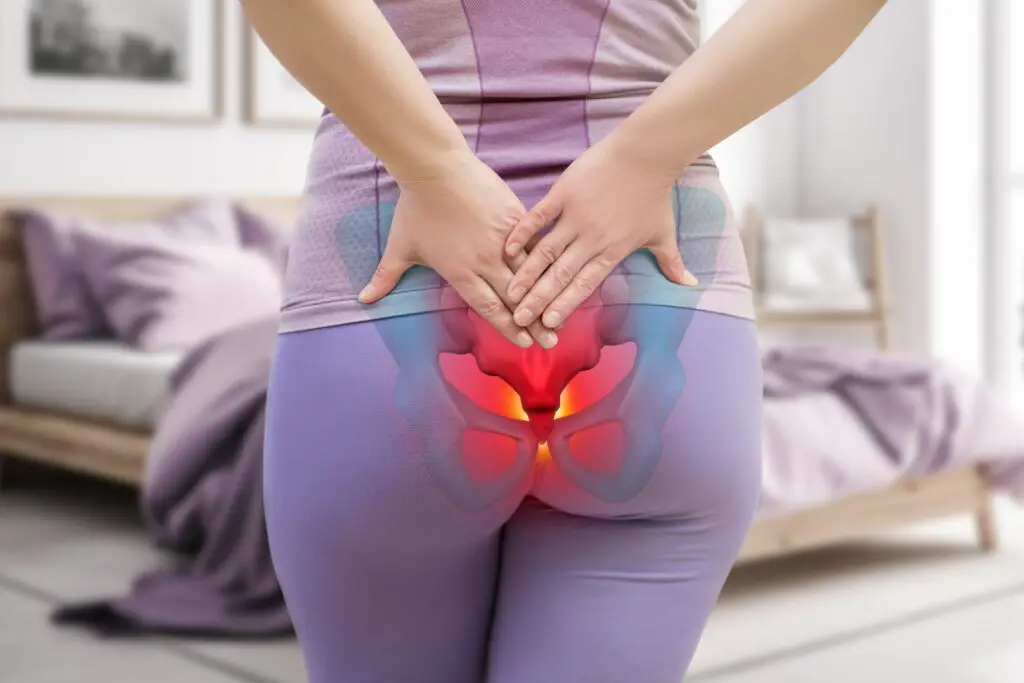


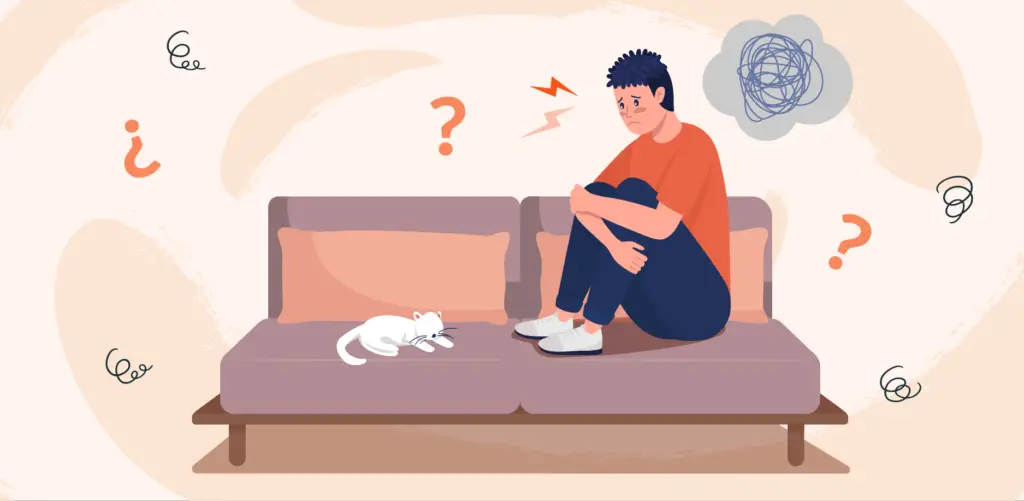




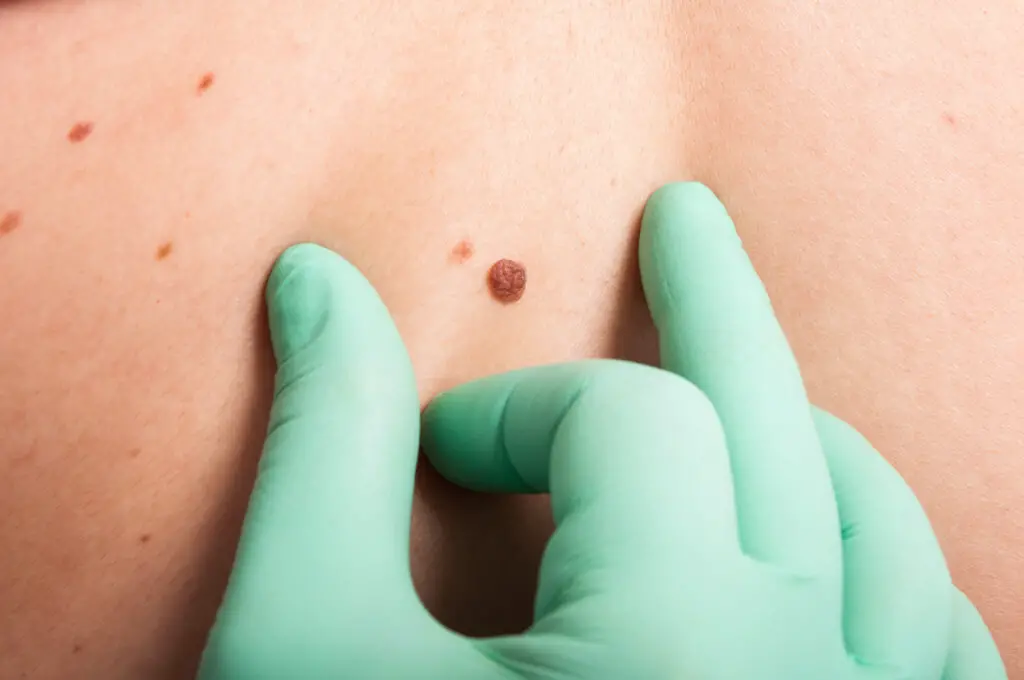
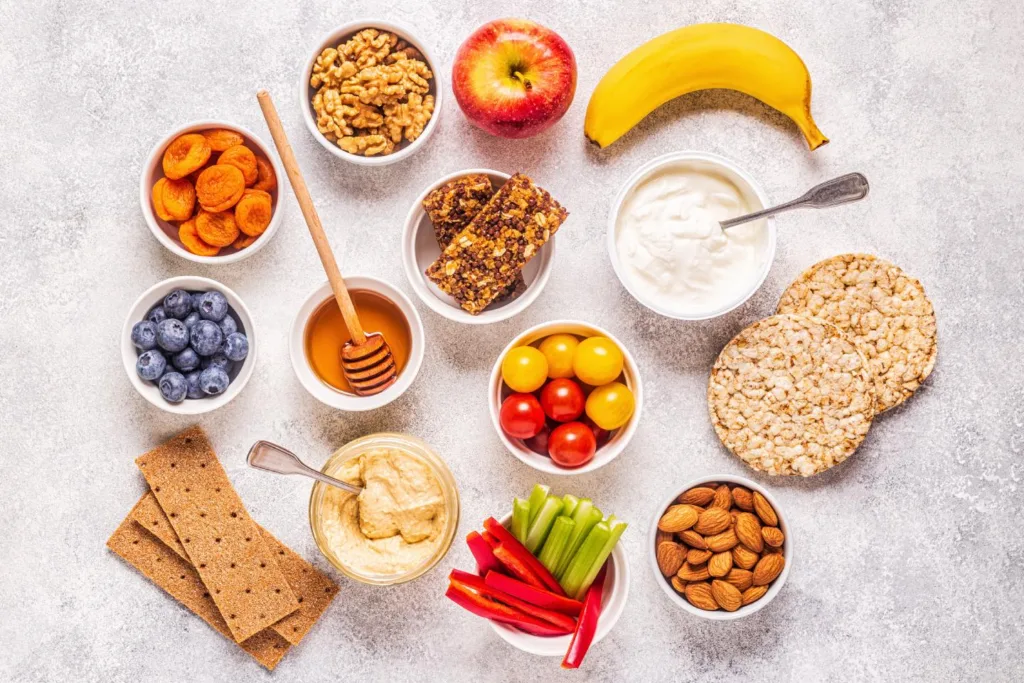
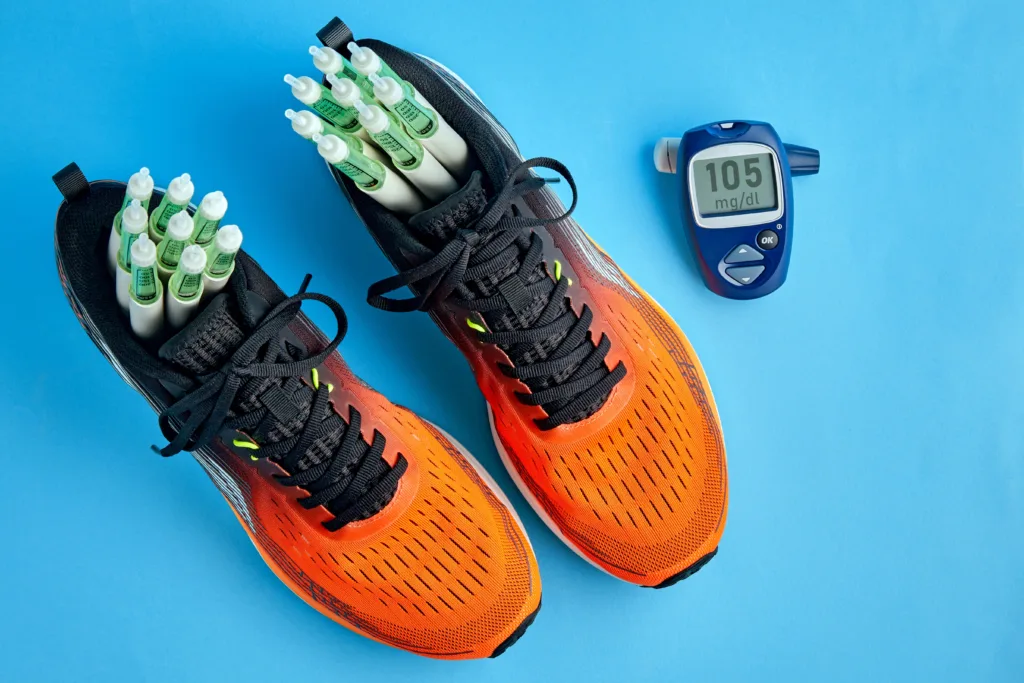

Comments
0